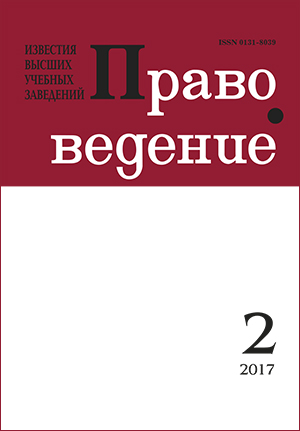Legal thinking as an intellectual component of the legal knowledge
Abstract
The author of the article focuses on the legal thinking which is a core of an intellectual component of the legal knowledge and represents certain spiritual and practical, as well as informative and evaluative intellectual operations connected with the existence of problem situations which are aimed at setting certain tasks and solving problems in the legal sphere. The interconnected comprehension of content (values) and identification of the sense of the matter under consideration constitute the main mechanisms of understanding as a result and one of the processes of thinking. At their intersection new images and verbally meaning forms are generated. The meaning generation is based on different and contradictory contexts manifested in the people’s lives. Goal formation is a key aspect of formation and development of sense in the individual activities. The legal thinking should be considered as a complicated comprehensive poly-structure which is based on certain forms and ways of the legal logic, the legal language and the world outlook bases and which consists of several horizontal formations and vertical levels determined by the objective logic of achieving intermediate and ultimate goals, by the unified and individual, theoretical and practical, professional and nonprofessional factors. The author notes that the ordinary, scientific and theoretical, as well as professional types of the legal thinking schematically represent essentially the same mental process of interpretation and construction of the legal reality. At the same time, the interrelation between the theoretical and practical approaches, as well as a professional component to highlight some of their significant features at the supraindividual level. It is emphasized that the daily individual legal thinking not only underlies other types of the legal thinking. Within the consciousness of a scientist or a law enforcement officer a “lawyer” does not replace a “common citizen”, they coexist. The thinking of a legal practitioner constitutes a complex dynamic system of the ordinary and professional types of thinking which are parallel and which at the same time exert mutual impact. Their interrelation depends on the extent of immersion into the legal matter and the legal environment.
Keywords:
legal knowledge, methodology of the legal knowledge, technology of the legal knowledge, legal thinking
Downloads
References
Downloads
Published
How to Cite
Issue
Section
License
Articles of "Pravovedenie" are open access distributed under the terms of the License Agreement with Saint Petersburg State University, which permits to the authors unrestricted distribution and self-archiving free of charge.




